On your first night in prison, it’s the screaming that cuts you deepest. Screaming like someone is hurt. Like they need help. Like someone is dying.
You don’t know where it’s coming from, it’s just out there in the gaps between the bright fluorescent lights of the halls and the darkness of the cells. Out there beyond the locked metal doors and suicide nets. Bouncing off thick brick walls, high vaulted Victorian ceilings, metal bars. Coming through the cold night. Coming for you.
My life was always about noise. About pin-drop silences and explosions of applause. The elastic pop of a volley and the snap of a net cord. White shoes sliding on green grass and camera shutters flickering.
The bedlam never lasts at Wimbledon. It escapes up past the old wooden rafters and the dark-green painted roof. It settles gradually from wild cheering to thundering waves of clapping pouring down the gangways and tiers. It’s your soundtrack and your world.
I never thought prison would be my world, but here I am at HMP Wandsworth. It’s just over two miles from Centre Court at Wimbledon. SW19 to SW18 – a single number in it but an impossible distance in between.
Perhaps worse than the screaming itself, as it echoes round this cold cell, with its mould and dirty toilet bowl, is the not knowing why it’s happening. Are these men asleep with nightmares, or awake and raging?
Sometimes you get ten minutes of quiet and you go back to your bunk and thin blanket and try to fit your body into the strange contours and confines of a mattress shaped by a hundred strangers. But it always begins again, triggering more shouts from other cells, an endless rally between opponents who can’t see each other but want to destroy each other just the same.
This is torture. Surviving it all is an impossibility. I’m in a cage with a bunch of psychopaths. I’m alone and I’m lost, a number that nobody knows.
I am not a victim. I made mistakes. I made some big ones. Sometimes I was naive, and sometimes I was childish. But my story might never have turned out this way had I not become the youngest champion in the history of the men’s singles at Wimbledon.
I was 17 when I beat South Africa’s Kevin Curren in the final on July 7, 1985, and I’m not sure I was ever in control again after that.
It started that Sunday night in south-west London and it never stopped. My father organising an open-air parade for when I got back to my home town of Leimen in southern Germany. I didn’t want a parade or to be on display in the back of an open-top Jeep, feeling too much like Pope John Paul II. It wasn’t my style and it wasn’t who I am.
When that sort of fame hits you at 17, it feels like someone else owns you. An editor of Bild, Germany’s most-read newspaper, once told me that ‘since the Second World War, we have three topics that we know are going to sell us most copies: Adolf Hitler, the reunification of Germany and Boris Becker. So keep doing what you do because it sells. It’s good for our business.’
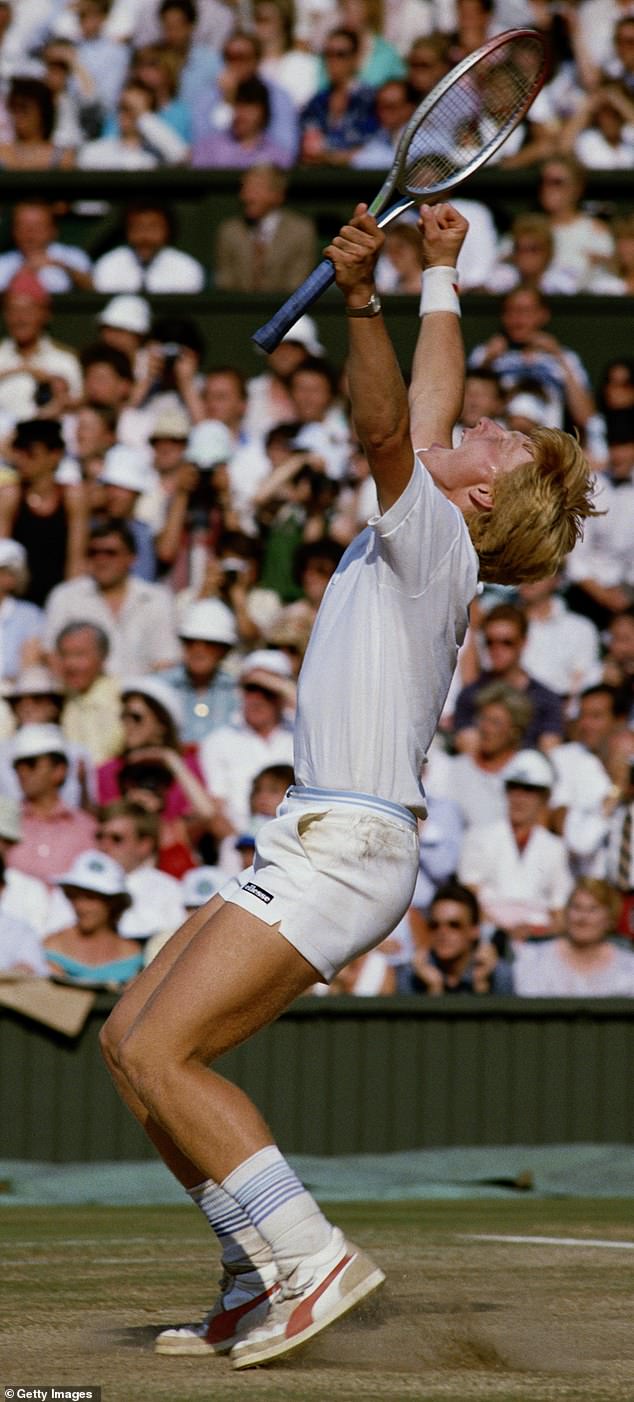
Boris Becker became Wimbledon’s youngest-ever men’s singles champion aged 17 in 1985
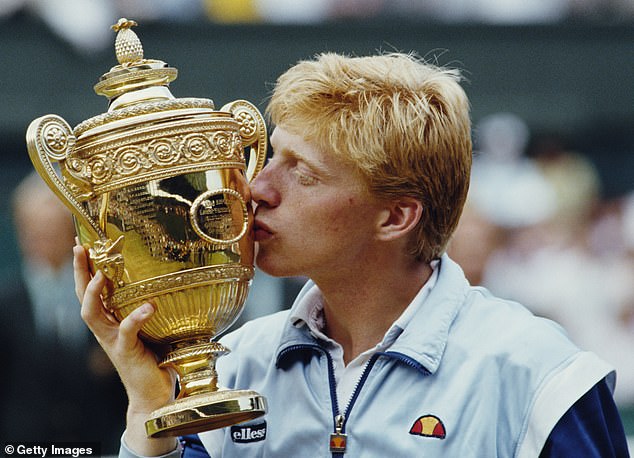
His victory propelled him to instant fame, leaving Becker feeling as though he’d lost all control
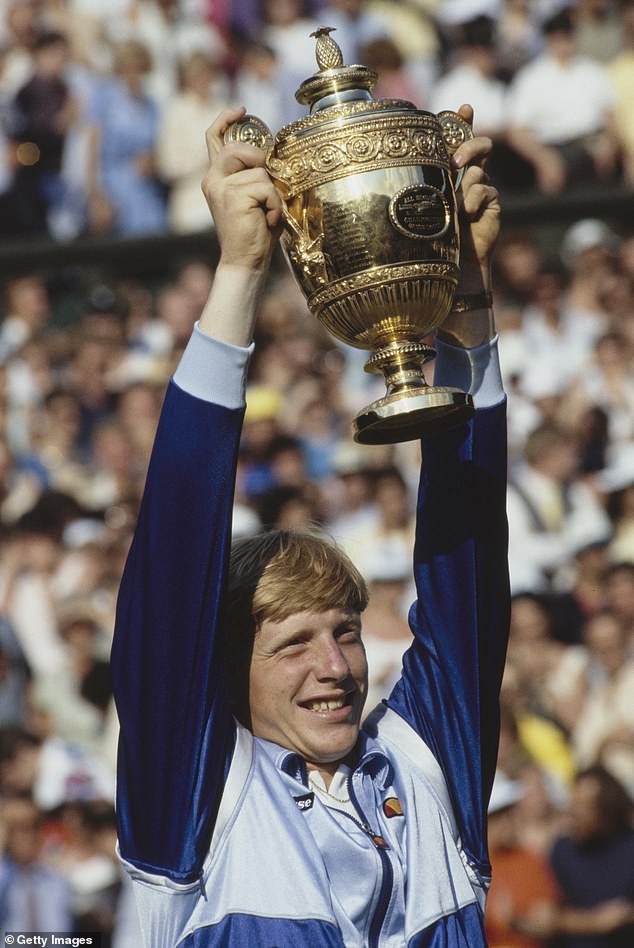
The tennis star’s father arranged for an open-air parade in Germany to celebrate the win
If I’d lost to Curren but remained successful, maybe No 5 in the world, these issues would never have come to me — the trust in older men to do my business, the habit of letting others run my finances.
I can’t blame these people. I wasn’t careful enough. I didn’t check whether they would actually do what they told me they would. I didn’t check whether what they advised me to do was actually legit after all.
It was errors like these that led me into the dock at London’s Southwark Crown Court where, on 8 April, 2022, a jury found me guilty of removing money from my bankruptcy estate without the permission of the trustee in bankruptcy in 2018.
I hadn’t realised that doing so was wrong. I made maintenance payments to my ex-wife, to my children, for knee surgery and for rent. It’s not something I tried to hide, not least because I thought I was doing what I should and when I heard the verdict my heart fell to my feet and the blood in my face and hands felt cold.
I was told to return to the same court for sentencing on April 29. It was a long wait and I faced it with my partner Lilian, the Italian-born daughter of parents from São Tomé, an island off the west coast of Africa.
When we met at a party in Frankfurt in 2018, I was newly separated from my second wife Sharlely and already in bankruptcy proceedings. But Lilian wanted me as a person, for what I had when everything else was stripped away.
After the guilty verdict was reached, I’d told Lilian that she didn’t have to hang around for me if I was incarcerated.
‘You’re too young. You’re at the beginning of your life. I love you, but I don’t expect you to wait.’

Becker and his partner Lilian arrive at Southwark Crown Court for sentencing in 2022

Lilian, the Italian-born daughter of parents from São Tomé in Africa, stood by him throughout

Lilian and Becker’s eldest son, Noah, at Crown Court. Becker hardly got the chance to say goodbye before he went to Wandsworth Prison to serve is two-and-a-half-year sentence
‘What do you mean?’ she replied without a second thought. ‘We are a team, we’re going to do this together.’
As we left our tiny rented flat in central London on the morning of my sentencing, I knew that I might not be coming home that day. My lawyers had talked me through the scenarios — at best a suspended sentence, at worst seven years in jail.
I said my goodbyes to Lilian and my eldest son Noah and then I was in the dock, behind glass and spinning my fingers around the rosary in my jacket pocket. The rosary I’ve had for years, as a young man sprinting from baseline to net, as an older man trying to find a new path.
Moving my fingertips over the beads, one to ten, as Her Honour Judge Deborah Taylor sentenced me to a total sentence of two years and six months.
I looked over and saw Lilian crying and the sadness on my son’s face. There was no last embrace, no physical contact. No final kiss.
Lilian and Noah walking down from the gallery and to the dock; me putting my palm up on the glass. Lilian mirroring me and matching her palm to mine. Noah doing the same. The hardest part of all.
Then I turned, and I stepped from one world to the next.
The guard at the back of the dock had an English politeness about him even in this moment. He asked me to pick up the bag I’d packed — bearing the logo of Puma, my old sponsors, but not free this time, a cheap bag picked up from Sports Direct just a few days before. Then he accompanied me down the steps.
The rooms below were all bright strip lighting and shiny, yellow walls. A small office at the end of a corridor, with a desk and an open window. Two officials inside, courteous almost to the point of appearing embarrassed at the formal dance.
‘Good afternoon, Mr Becker, how are you? Sorry about what’s just happened. Please remove your suit and tie.’
You can’t ignore the crunching of gears in that moment. Stripping off my Ralph Lauren suit, unknotting my Wimbledon tie. Folding both neatly, as if I were going to be putting them back on in the morning.
Swapping them for the black Puma hoodie and tracksuit bottoms from my bag, stepping aside so they could search through the rest of my gear.
The two shaving razors I had packed were taken away. So were the nail scissors. The bottle of aftershave – well, who tries to take aftershave to prison but a man who has no idea about prison?
I’d packed a cheap Casio wristwatch because, even with my aftershave delusions, I guessed that wandering around prison with a big expensive ex-tennis player watch on my arm wasn’t a smart move. What I didn’t understand yet was that time doesn’t matter at all in prison. You make it not matter, because it’s an enemy that eats you up inside.
The van waiting outside was white, with a door at the rear. The word ‘Serco’ in lower-case black letters. Inside, six tight, separate cells. A small square of window in each, the glass dark. A bench, no seatbelts.
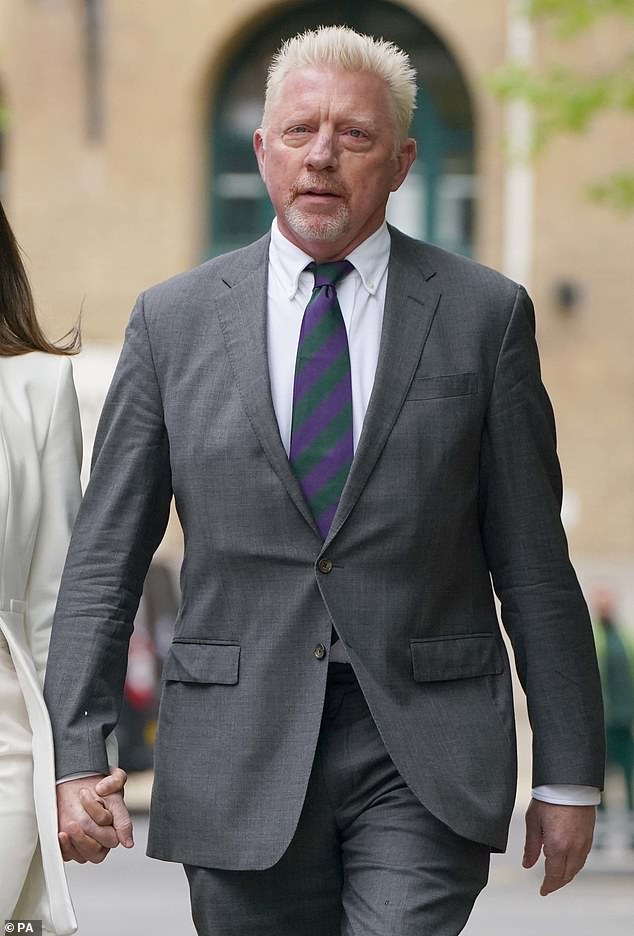
The six-time Grand Slam winner was jailed for removing money from his bankruptcy estate without the permission of the trustee in bankruptcy in 2018
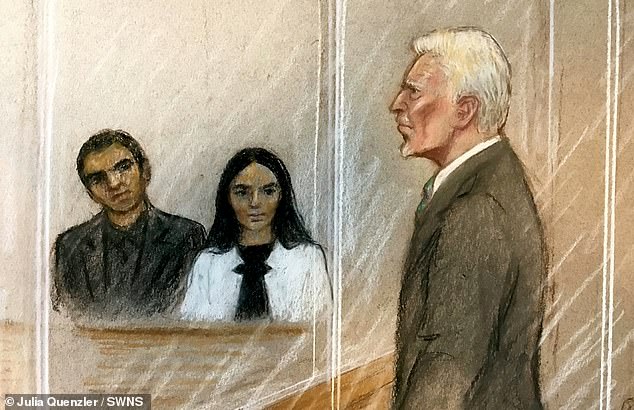
A courtroom sketch from Becker’s trial in London. He declared bankruptcy in June 2017
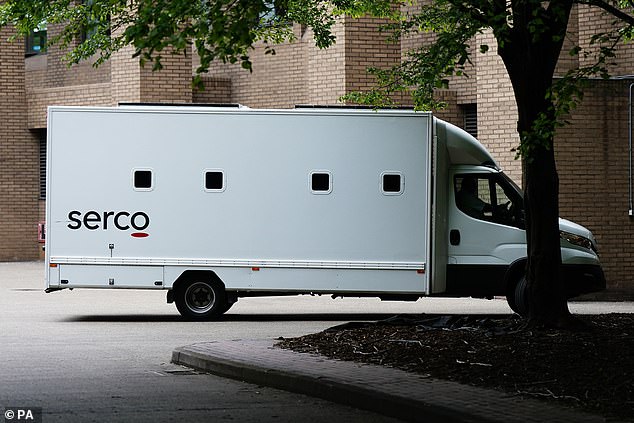
A prison van carrying Becker leaves Southwark Crown Court after the German was sentenced
They don’t linger once you’re on your way to prison. Accelerating through the black metal gates at the back of the courthouse, leaning and listing round the corner as the photographers held up their cameras to the windows and fired off the flashes.
An hour of yelling and screaming from an angry guy in one of the cells then silence as the van slowed through the main gate at Wandsworth. The paparazzi had got there ahead of us.
A great wooden door under a stone arch, two towers either side with thin windows like the arrow slits in the keep of a medieval castle. The doors thrown open by guards with guns on their belts. Okay, this is real now.
There must have been 40 prisoners in the holding cell inside. You could feel the attitude all around you, a toughness in demeanour and dress. Now my fear started crawling towards the surface for the first time.
I was inside the factory now. Being processed through the machine. A man goes in; a number comes out.
They told me that I couldn’t keep my black top and tracksuit bottoms. Too close to the colours worn by the wardens. Instead they gave me two light grey tracksuits and a couple of white T-shirts.
Without my clothes, I felt like I lacked armour. I wanted to tell them that the stuff they had given me was too small, and that it itched my skin. Then it creeps up on you: this is not my choice any more. I wear what I’m given, or I wear nothing.
A full body search. Those washed-out borrowed clothes piled on the floor next to you, the guards snapping on rubber gloves, telling me to spread my legs, touching everything.
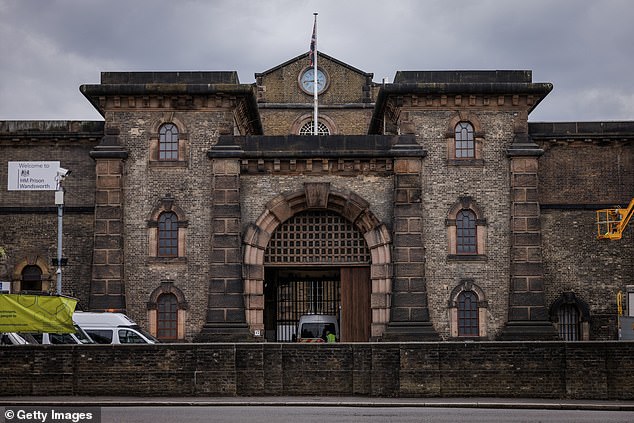
Wandsworth Prison marked a fall from grace, as he moved from the heights of SW19 to SW18
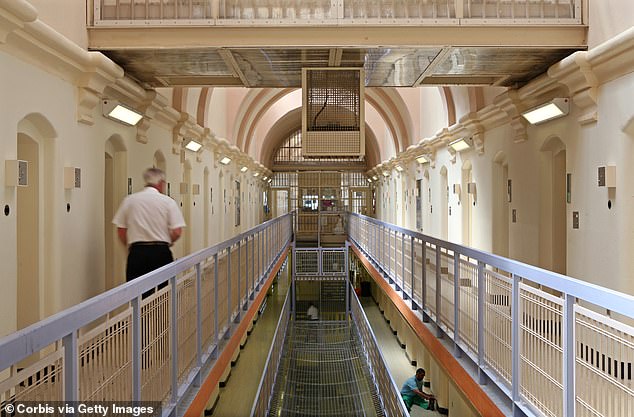
Becker was surrounded by screams during his first night in jail, in a harrowing experience
‘What exactly are you looking for?’
‘Oh, it’s your first time here, is it? You’d be surprised what we can find.’
Another shouted instruction and into an office for a warning.
‘This is a dangerous place. Watch your back. We’ll try to look out for you. You’re one of the most famous guys in here. But there are only 70 or so of us, and there are almost 2,000 prisoners.’
Walked towards my cell, I had no idea about the notable and notorious who had previously stared at these Victorian stone walls: Ronnie Biggs, the Krays and Gary Glitter, Pete Doherty and Oscar Wilde.
Everything metal and harsh and cold. Everything clanging and echoing and reverberating on for ever. An open atrium, great wide nets under every overhang. It took another week for me to work out what those nets were for, to realise that falling might be something you chose to let happen.
They took me first to a cell on the ground floor. I thought: this can’t be right, it’s too small. I could smell the damp and I could see it in the corners and on the ceiling – green smudges of mould, darker blooms of fungus along the floor and the bottom of the walls.
The door shut, and the key turned, and that’s when it really hit me, for the first time. How can I be in here?
I scanned the room, to slow my breathing. Eyes resting on each object, on every angle and detail. A grey steel door, a hatch set within it. The single bed and its blue plastic mattress. Folded white sheets in clear plastic shrink-wrap.
One pillow, one blanket. The cold already settling in the cell along with the damp. You will sleep in your tracksuit, always your tracksuit at the very least.
Back to scanning the room. A little metal sink, a small feeble toothbrush that could snap in your hand if you brushed too hard.
The toilet, small and metal and without a seat or lid. One metal chair, against the wall, and a basic wooden wall unit.
I had already unpacked when the wardens knocked on my door.
‘You have to change to a different cell. We have an older guy in a wheelchair coming in. He needs the ground floor.’
I was taken to the first floor, right in the middle of a long row. A dank mouldy cell became a noisier dank mouldy cell with a door whose broken hatch let the light, the shouts and all the madness just pour straight in.
I lay on the bottom bunk, draping a few clothes over the edge of the top bunk to create a little curtain, privacy from those who might stare in. And that’s when the screaming began.
It was still going on at one in the morning, settling to just a couple of wild voices at 2am. Then it was flashlights shining in my face, sometime before dawn.
The first night, you have no idea that for the first few weeks the wardens will check on you every two hours. So you throw your hand over your face and then stand up with your arms in the air like a crazy, scared man. Then you either fall back asleep or you’re up now and that’s it.
My first morning in Wandsworth was a Saturday. I wanted to wash. I wanted aftershave. I wanted food. But with fewer staff on duty at weekends, cell doors weren’t opened until 11.30am.
I’d brought with me Barack Obama’s autobiography and for a while I appreciated the few hours of comparative calm it brought me amid the chaos. But three hours of reading is too much even if you’re sat in a deep armchair at home with a whisky.
Finally I heard the wardens, and their keys. It was a female warden that first morning.
In time you figure out the big secret they don’t want to tell you – that prisons are run not only by the guards but sometimes by the inmates. But she knew that I didn’t know and behaved that way. No hint of weakness. Tough as hell, with language ripe for a Centre Court code violation.
Walking out into the noise and echoes and harsh lights, I followed the others going to the canteen and stayed close to the wall because I was afraid. Afraid of the not knowing, afraid of what might come in the next corridor. Afraid of these other men, unsmiling, staring, looking awful in the same grey track-suit bottoms as me.
You can feel danger like a physical force, sometimes. I couldn’t stop looking at the trays of plastic knives, the plastic forks. You don’t want metal in there, but plastic still cuts. Plastic still pierces.
In the queue, I was approached by Jake, one of the ‘listeners’, prisoners who are the link between the inmates and the wardens. There when you first arrive and you’re feeling lost, they’re trained by the Samaritans and are your guardian angels in tattoo sleeves.
Jake was in his late twenties, mixed race, quite tall, carrying himself with confidence. He took me to meet Mohammed who was another listener and worked in the kitchen.
I would get to know him well, and to me he would become Mo. Tattoos everywhere and a gym nut who was a diehard Liverpool fan.
For now he was just looking out for me as the new signing.
‘This one is s***,’ he said pointing to the sausage. ‘Take the chicken. If you want more, come back to me in 20 minutes.’
I carried the tray back to my cell, eyes on the floor ahead of me, and ate it all. At 12.15pm the door was locked again and I let the thoughts come at me. Strategies first, like I was back on court, like I needed to work this one out.
Tennis is complicated but straightforward at the same time. At the start of every big match the question for me was always the same: ‘When we finish, is your mother going to cry or is my mother going to cry?’
With age had come the understanding that, for good or bad, I could thrive in the middle of a fight so I decided I would go out there strong each day and present myself as a resilient, independent individual with the right group.
What was the alternative? Prison is about reputation. It doesn’t matter if you actually are strong, only that everyone else believes you are.
At 4.30pm, the cell door was unlocked again for dinner. Mo pointed out to me the bad stuff and the slightly better stuff then, before lockdown at 5.30pm, I went to the showers with Jake and the regular inmates he brought together.
It’s strange, feeling so lost doing something so familiar as taking a shower. A simple daily task turned complicated in an alien world. Hearing the outer door to the shower room being locked behind you by the wardens.
They do not go into the showers so if you’re in there with the wrong group then no one is coming to save you.
Some days those showers would be icy cold. You never knew why. It was just another unpleasant fact in a day you don’t control.
Dirt all over the floor, on the tiles. I was lent a pair of flip-flops. Boris, wear them, because we don’t know who was there before. The first time in my life I ever showered in flip-flops. You don’t have to think about flip-flops in nice hotels.
One towel each, a bar of soap. Some of them brought shower gel and Jake explained that you could buy this and other items from a list in the canteen, using your weekly £15 allowance for food and phone calls. I could also get a job if I wanted to earn a little more.
Back in my cell, I felt progress. I had eaten. I had washed. I had been part of a group, if only for the 15 minutes we had in the shower, and shown Jake and some of the other listeners that I wasn’t dangerous or falling apart.
They wouldn’t trust me yet but they could start thinking about it and when I was properly part of their team, they might protect me and I could start to belong, in a place I never wanted to stay.
Everything that first day and first weekend was the beginning of new rituals. Locked up on your own for twenty-two and a half hours a day, with no one to talk to but the voices in your own head, you’ll use anything to pad out the gaps.
I came to like the morning TV shows: BBC Breakfast, Lorraine on ITV, and the guests she had on, some of whom I even knew. I looked forward to Kate Garraway and Ben Shephard. I even watched Loose Women. You make time for any distraction you can, in prison.
On Tuesday, the listeners had news for me. They needed an assistant to help teach other prisoners maths and English.
That was the day everything changed. When you work, your door is open each morning. You are out of your cell for two hours before lunch, and another two in the afternoon. Four whole hours!
I started the next morning in a small classroom with four rows of desks, me standing at the front with a blackboard and chalk. Ten student inmates in the morning, maybe 15 in the afternoon.
I have coached tennis players before. I was on Centre Court when Novak Djokovic won the Wimbledon title with the tactics and mindset we planned. So this was different, but I could feel the same needs.
Teaching is less about you telling people things and more about you taking notice of what they need and what they might be struggling with. It’s about being on their side, not always at the front.
These prisoners could see that I was helping and I felt a little respect in return. I had a role, even if it was a small one. But I was still getting things wrong outside of the classroom.
Trying to shave with the stubby little razor they had given me, I ended up with nicks on my cheeks and stabby slashes under my chin and down my neck.
Soon after, I was summoned to a medical with the doctor who asked if I was self-harming. Why would I? My mind was only focused on doing things to protect myself.
Bad news comes in rushes in prison. My lawyers had told me that after six weeks I would definitely be transferred to an open prison where I’d be able to go home at weekends and sleep there only at night. But after the medical I was summoned to the head office and told that instead I would be sent to a prison for foreign nationals, which would be just like being in Wandsworth only without the British inmates.
Where do you find your light in a world like this? I had my phone calls to Lilian, and the new teaching job that helped fund them. And my devotion to the lowest paying work I’d ever held sometimes puzzled her.
‘Amore, why didn’t you call when you said you would?’
‘I’m sorry, I was busy at work.’
‘You’re in prison and you’re busy?’
I learned quickly that when you don’t have your phone calls, you have no way of ever being yourself. You become the walls around you, the grey stone and damp floors and mould in the corners.
Without your phone calls, you lose the softer parts of you that you hide at all other times. Even inside, love is what keeps you warm from within.
As the days went by, I learned that you could get anything you wanted in prison. Alcohol was easy. People made it themselves with sugar, fruit and other things you could buy legitimately with your allowance from the canteen.
A potent kind of schnapps was the most popular. On a Friday night you would see gatherings on every corner, water bottles being passed about and laughter and noise.
Officialdom seemed to turn a blind eye. It’s Saturday the next day, so no one’s getting up for work, and if you lie in bed all day until Sunday then no one’s going to do anything about it.
Then there were the drugs. Weed, pills, heroin. Sometimes they came in the prison version of internal mail. Up the back passage.
Sometimes it was the wardens – someone taking a cut, someone with a weakness or a problem left vulnerable to a bribe or extortion.
While the drug abusers escape into their heads, some of the younger prisoners do it by self-harming, which is why the medical team asked if I had cut myself deliberately.
What the self-harmers don’t know, when they first do it, is that the medical care inside is terrible. A deep cut with a razor will be cleaned and bandaged but not treated so it heals nicely. The scars on your forearms, on your face? They’ll be with you for life.
These were not precision cuts. No clean lines or easy stitches. A knife fashioned from rough plastic or a blunt Biro, jagged edges and torn skin. Scars always leaking and puckering.
You saw them each day, once you knew they were there. And when I did, it chilled me every time.
I tried to focus instead on the routines which might get me through, like buying myself an apple for breakfast each day, and having it with an instant coffee.
At home I would have espresso, made using pods in a machine. So, although it’s hard to admit it, even now, when I first saw the kettle in my cell, I thought it might be for soups, or to store water. I didn’t know how to make the water hot.
The food in general was so bad it was hard to get it in. You don’t burn many calories lying on your bed for 14 hours a day but in four weeks I lost seven kilograms in weight.
‘Maybe we should ask if you can stay in longer,’ said Lilian on one of the two visits I was allowed a month. Such jokes were our way of dealing with the stress of the situation.
Loneliness is a peculiar thing, when you’re in prison. It doesn’t always strike when you’re on your own. Sometimes you walk away from the visitors’ hall, and even as the sweet aftertaste lingers, the senses pick up on a sudden absence.
I’m glad I didn’t know that, after the first visit, Lilian had gone back to the flat and cried. I’m glad she didn’t know that I went back to my cell and did the same.












